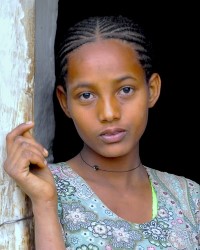The Tigre are nomadic shepherds who traditionally lived in Eritrea and northeastern Sudan. Historically, most of the Tigre have been scattered between Eritrea's northern highlands and western lowlands. Today they also have a scattered diaspora that lives mostly in various parts of the Horn of Africa countries. Some are further north in Egypt.
Although many are still nomads, most are semi-nomadic; others have become settled farmers. Even those who are herders do some farming to ensure an adequate food supply. The nomadic Tigre raise cattle, goats, sheep and camels. They sell these animals in the markets, and the earnings are used to buy essential items. The nomads do not live in villages but roam about the countryside with their herds. They live in round huts, usually covered with mats made of woven goat or camel hair.
The semi-nomadic Tigre usually spend half the year in the northern highlands and the other half in the western lowlands. Their villages usually have only two or three huts. Their huts are also round and are covered with mats made of woven goat hair. They also tend livestock, usually cattle and goats.
The settled Tigre farmers raise corn, sorghum, wheat, barley, legumes and linseed. They live in villages, and their homes are usually round with cone-shaped roofs made of branches and leaves. The walls are typically made of palm mats. Most of the farmers raise goats and, occasionally, cattle. Oxen, mules, and donkeys are used as pack animals. With unpredictable amounts of rainfall and families averaging seven children, they often live on the brink of existence.
The Tigre's traditional animal skin clothing has now been almost entirely replaced with commercial clothes. Their diet consists of dairy products, fruit, grain, and some slaughtered stock. Breakfast is a sorghum porridge. Wives are forbidden to eat with their husbands; she eats with younger children and daughters. Husbands eat with other male family members.
The men tend livestock while the women carry water from local water holes, build the huts, and care for the children. Tigre women like to wear jewelry, especially silver bracelets and strings of pearls. They also prefer to make their clothing from colored cloth, which is available at trading markets. Tobacco, coffee and beer are frequent indulgences.
Marriages are arranged by parents. Usually, the father of a potential groom asks the father of a potential bride if she is ready for marriage. The date of the wedding is determined by the groom's father and diviners. The father of the groom arranges for a huge banquet and a dowry for her father's family. Even a week before the banquet, there is singing and celebration. The entire community helps to make wedding preparations.
Although the Tigre profess to be Sunni Muslims, most of them practice folk Islam, which is a blend of Islam and ethnic beliefs. Their traditional beliefs include animal sacrifices and rain-making rituals. They offer sacrifices of livestock or corn whenever they think their sins are numerous. They believe that the sacrifice becomes the scapegoat for their sins.
The Tigre also believe in an evil spirit named Zar, who possesses people and causes accidents, illnesses and sometimes death. The people depend on shamans (priests) to cure the sick, communicate with the spirits and control events. The shamans also exorcise demons and perform services by entering into a trance.
There is a marginal Christian influence of the Eritrean Tigre coming from the Orthodox tradition.
Eritrea has one of the worst records for human rights worldwide. Those who have fled to Egypt are often dealing with emotional trauma.
Ask the Lord to call additional long-term workers to live and work among the Tigreans.
Pray that the Lord will give Tigrean Christians boldness to share Jesus with their own people in Egypt.
Ask God to use the few known Tigre Christians to disciple others.
Pray for the Holy Spirit to anoint the gospel as it goes forth via the JESUS Film among the Tigre.
Scripture Prayers for the Tigre, Eritrean in Egypt.
https://en.wikipedia.org/wiki/Tigre_people
https://101lasttribes.com/tribes/tigre.html
https://www.britannica.com/place/Tigray-historical-region-Ethiopia
| Profile Source: Joshua Project |











